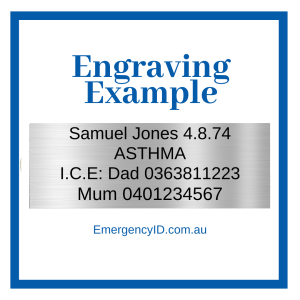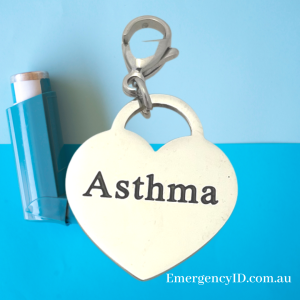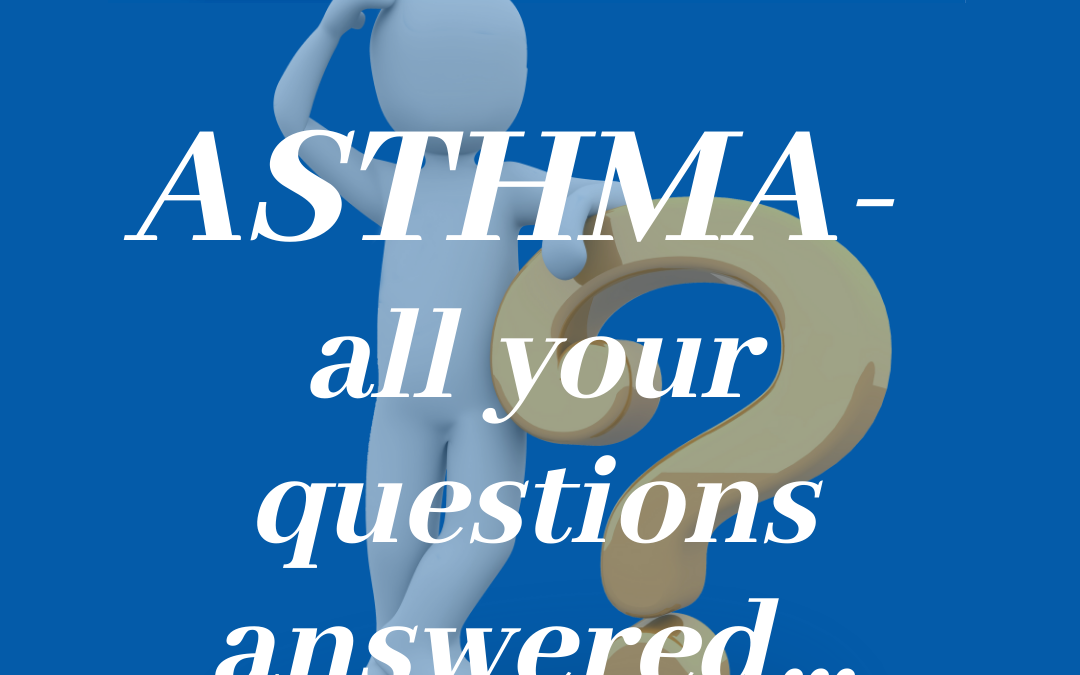ASTHMA – all your questions answered…
Key facts
- Asthma is a long-term lung condition that is caused by narrowing of the airways when they become inflamed.
- People with asthma experience difficulty breathing, and the most common symptoms are wheezing, coughing, feeling ‘out of breath’ and tightness in the chest.
- Symptoms are usually mild but can flare up and cause an ‘asthma attack’ that may require hospital care.
- There are effective medicines for asthma that, if taken correctly, will help you feel well and keep you out of hospital.
- Asthma can be managed with reliever inhalers to treat symptoms and attacks. Preventer or controller medications can prevent symptoms.
What is asthma?
Asthma is a common condition that affects the airways (breathing tubes) in your lungs. People with asthma have sensitive airways that become inflamed when exposed to triggers. Inflamed airways make it difficult to breathe which leads to mild symptoms like wheezing, coughing or breathlessness.
Asthma affects 1 in 9 Australians, and 1 in 4 children develop asthma sometime in their childhood. However, any adult can get asthma, even if you didn’t have it as a child.
Sometimes asthma can flare up and symptoms become worse compared to usual — known as an asthma attack. Some asthma sufferers describe asthma attacks as feeling as though you are breathing through a straw. They can happen rapidly (such as after exposure to smoke), or emerge gradually over hours or days (for example, after getting a cold).
A serious or severe asthma flare-up needs urgent medical attention from a doctor or hospital emergency department, even for people whose symptoms are usually mild or well controlled.
If you or another person show signs of a severe asthma attack, call triple zero (000) immediately and ask for an ambulance. If calling triple zero (000) does not work on your mobile, call 112. Early treatment could save a life.
What are the symptoms of asthma?
While symptoms vary from person to person, the most common signs of mild asthma include:
- difficulty breathing — feeling breathless, even while resting, or being unable to finish full sentences before needing to take another breath
- wheezing — making a whistling sound while breathing
- coughing — either at specific times (for example, at night, early in the morning, during cool weather) or after certain activities (such as exercise)
- tightness in the chest
- a lack of energy
During a severe asthma attack, you may notice more serious symptoms, such as:
- feeling very distressed, exhausted or even limp from trying to breathe
- deep sucking motions at the throat or chest while trying to breathe
CHECK YOUR SYMPTOMS — Use the Symptom Checker for breathing problems and find out if you need to seek medical help.
When should I call an ambulance?
Call triple zero (000) immediately and ask for an ambulance if you notice symptoms of a severe asthma attack. It’s important to have an ‘asthma action plan’ for anyone under your care, so you can recognise symptoms of an attack and know how to manage them when they happen.
What causes asthma?
Experts aren’t sure why some people get asthma and others don’t. You are more likely to have asthma if someone in your immediate family has asthma. A child’s risk of developing asthma is also greater if they were born premature or with low birth weight, if the mother smoked during pregnancy, if they live in a house with people who smoke, or if they have been exposed to air pollution or mould.
Healthy adults can also develop asthma after extended exposure to air pollution (such as fumes that irritate the lungs, or breathing in dusts that they’re allergic to). Even athletes can get asthma this way — for example, if they have trained intensely while breathing in polluted, cold or dry air.
Common triggers of asthma may include:
- allergens such as pollen, dust, food items and mould (allergic asthma)
- smoke from cigarettes, bushfires and traffic pollution
- other irritants such as cleaning products, perfumes, aerosol products and certain workplace chemicals
- physical activity (referred to as exercise-induced asthma)
- infection from viruses
How is asthma diagnosed?
To diagnose asthma, your doctor may request:
- your medical history
- family details, such as whether your close relatives have asthma or allergies
- breathing tests to assess how your well your lungs are working (such as spirometry)
For children aged under 5 years who find breathing tests difficult, your doctor may prescribe some asthma medication first (referred to as a ‘treatment trial’), then use the results of the treatment to make a diagnosis. Asthma is likely to be diagnosed if the symptoms improve quickly with reliever medication.
You may also need to undergo allergy testing. This is because asthma is more likely to be diagnosed if your symptoms are triggered by known allergies, or occur at the same time each year (seasonal).
FIND A HEALTH SERVICE — The Service Finder can help you find doctors, pharmacies, hospitals and other health services.
How is asthma treated?
Asthma treatment helps keep your lungs healthy, prevents asthma symptoms from interfering with normal life and helps prevent flare-ups or attacks. Your doctor may prescribe or suggest these treatments.
Medication
There are three main types of asthma medications: relievers, preventers and controllers.
Asthma relievers
Asthma reliever medication helps open up your airways quickly to relieve symptoms during an asthma attack. They work within minutes and the effects can last for about 4 hours. One common reliever medication is salbutamol (Ventolin). You or your child may need to use asthma relievers more regularly until the symptoms are gone, but use them as prescribed by your doctor.
Asthma preventers
Asthma preventer medicine helps prevent asthma attacks and keeps your asthma under control. Preventer treatments relax your airways with anti-inflammatory medicine — usually corticosteroids, a substance similar to the steroid your body produces — into your lungs. Preventer medication comes in either inhaler or tablet form and should be taken every day.
Sometimes, short courses of oral corticosteroids (such as prednisolone) may be used to help manage asthma flare-ups.
Asthma controllers
Asthma controller medicine helps to control asthma when a preventer medication isn’t enough. They help in a similar way to asthma reliever medications but last longer, and are often combined with a preventer medicine into a single inhaler.
Sometimes, short courses of oral corticosteroids (e.g. prednisolone) may be used to help manage flare-ups of asthma.
Using inhalers and spacers properly takes practice, so it’s important to learn the correct technique for getting the optimal amount of medicine. Read our article on how to use an asthma inhaler.
It is important to note that severe asthma is asthma that can’t be controlled despite the correct use of prescribed high-dose regular preventer medicines.
A small number of people may experience severe asthma and have symptoms which are not adequately controlled with high doses of treatment, and they may need additional treatments. For more information on the treatment of severe asthma visit the Asthma Australia website.
Avoiding asthma triggers
Asthma triggers cause your airways to narrow and lead to asthma symptoms. These triggers vary from person to person, but avoiding or managing them can help to control asthma.
Read the National Asthma Council’s article on potential triggers.
Having an asthma action plan
You and your doctor will also put together an asthma action plan. This is a personalised set of instructions that includes a list of your usual asthma medications and doses, guidance on what to do in different situations (for example, if you have an asthma emergency), and your doctor’s contact details.
View examples of asthma action plans here.
ASK YOUR DOCTOR — Preparing for an appointment? Use the Question Builder for general tips on what to ask your GP or specialist.
Can asthma be prevented?
Asthma can’t be prevented entirely, but there are some practical ways to reduce the risk of an asthma attack and live well with asthma.
- Get vaccinated for influenza: flu and other respiratory viruses are common triggers for asthma.
- Manage any allergies: asthma and allergies are closely linked, so treating allergic rhinitis (hay fever) and avoiding or managing any allergy triggers will help with your asthma.
- Live smoke-free: quit smoking if you smoke, and avoid any second-hand smoke (passive smoking).
- Eat well: a balanced diet helps you to maintain a healthy weight. Being overweight or obese makes asthma harder to manage.
- Care for yourself: mental health and asthma are linked, so let a trusted friend or your doctor know if you have been feeling sad or anxious, or don’t enjoy things as much as before.
- See your doctor regularly: asthma needs to be regularly assessed and managed, and your medication needs may change over time. Ensure your asthma action plan is up to date by checking in with your doctor regularly.
What are the complications of asthma?
Poorly-controlled asthma can have a negative effect on your quality of life. Complications may include:
- fatigue or exhaustion
- poor sleep
- being less productive at work or while studying
- an inability to exercise and be physically active
- reduced lung function
- poor mental health
Taking your medications exactly as prescribed is important. If you feel that your asthma is affecting your quality of life, contact your doctor for a medicines review.
Other questions you may have
Does asthma affect my pregnancy?
About 1 in 2 Australian women with asthma find their symptoms worsen during pregnancy. Do not stop taking your preventer medication while you’re pregnant. Taking prescribed medications is safer for you and your baby than having poorly-controlled asthma. Read more about asthma and pregnancy here.
How does COVID-19 affect my asthma?
Experts are still trying to understand how COVID-19 may affect people with asthma. Early indications seem to suggest that people with asthma are not especially impacted by COVID-19. However, it’s still important for you to take extra precautions if you or your child has severe asthma, including practising physical distancing and good hygiene. Read more about COVID-19 and severe asthma.
Resources and support
For more information and support, try these resources:
- Call Asthma Australia on 1800 278 462 to connect with an Asthma Educator and ask for advice.
- Log on to the Asthma Buddy app to help keep track of your symptoms and get the latest information on asthma.
- Watch National Asthma Council’s how-to videos to learn how to use your inhaler or nasal spray.
- Use National Asthma Council’s My Asthma Guide for practical strategies to help you understand and manage your asthma.
- Read more about managing asthma and other conditions during COVID-19 on the Lung Foundation’s website.
Other languages
Do you prefer to read languages other than English?
- Health Translations Victoria has asthma fact sheets in community languages, including first aid plans.
- NSW Health’s Multicultural Health Communication Service offers translated resources, including the asthma action plan in Arabic, Chinese, Nepalese and Vietnamese.
Learn more here about the development and quality assurance of healthdirect content.
Last reviewed: June 2020
Asthma – complications, causes and symptoms | healthdirect

To view our range of CUSTOM ENGRAVED Emergency ID medical alerts please see our products and dont forget to check out our accessories.

To view this ASTHMA alert charm please click here







